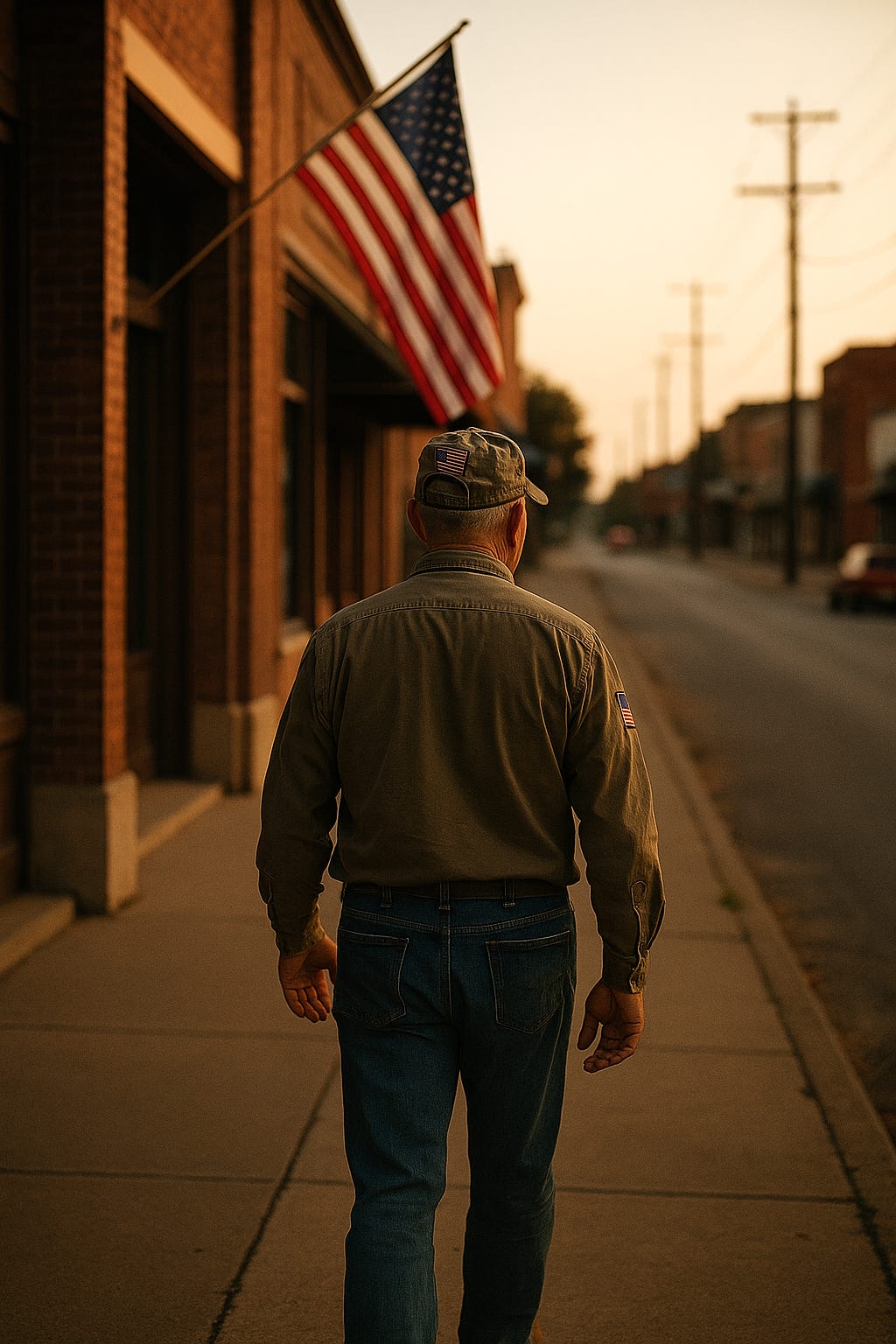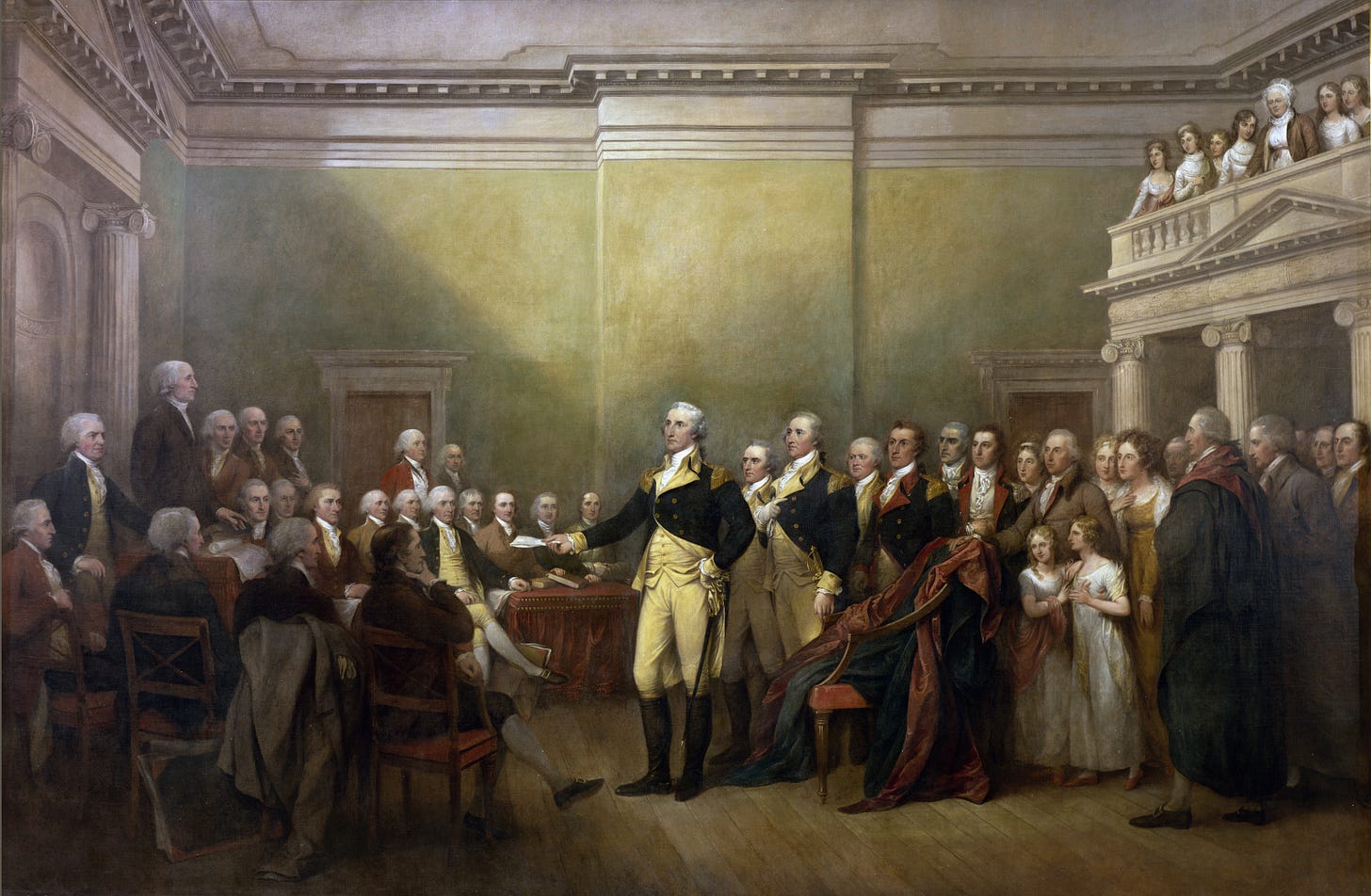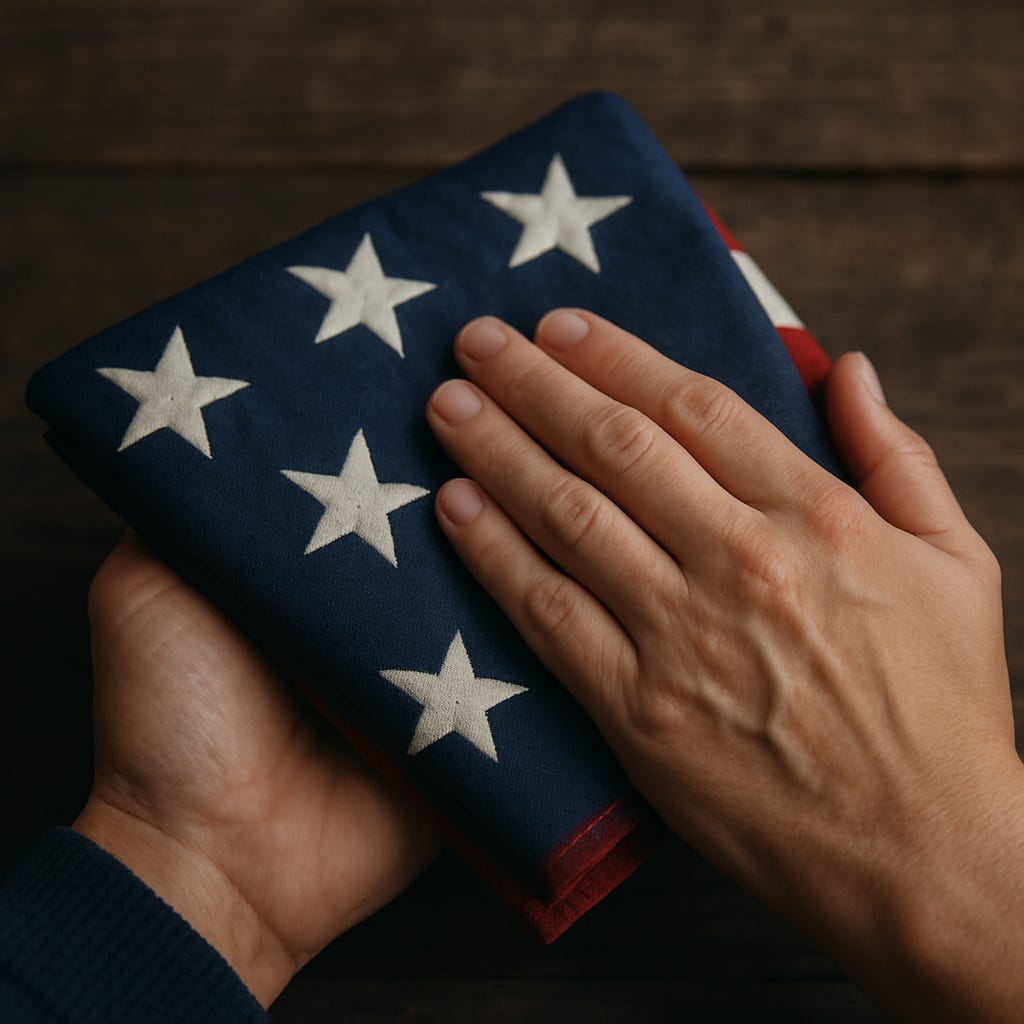The Citizen Soldier
Liberty’s Living Thread
The high school gym smells like popcorn, dust, and varnish, the kind of scent that never really leaves a floor, no matter how many coats of polish it gets. Rows of folding chairs stretch across the court, and the school band works through a careful version of “America the Beautiful” that wobbles a little at the high notes. Near the front, a man in his late seventies straightens his collar as a student pins a paper poppy to his lapel. The applause around him is gentle, almost polite, but when he closes his eyes for a moment, you can see something deeper settle over him. It is the look of someone who carries memories far heavier than the ceremony can possibly express. He has been home for fifty years, yet part of him still lives in the places where he once served.
Hamilton would have understood that expression. Madison would have recognized it, too.
The Founders argued endlessly about many things, but they shared one belief with remarkable consistency. A republic survives only when its citizens see themselves as responsible for its defense. Not only in war, but in peace. Not only in emergencies, but in the steady work of preserving liberty.
When Hamilton wrote Federalist No. 29, he knew that freedom cannot rest on a permanent warrior class. It depends on ordinary people who answer the call when needed and return home as quietly as they left. He was not interested in creating a society where military power overshadowed civilian life. He was searching for a balance that would keep the republic strong without weakening the character of its people. Hamilton warned that liberty can become brittle if citizens forget their role in defending it. As he put it,
“A tolerable expertness in military movements is a business that requires time and practice. Yet it is a matter of utmost importance that the people should be properly armed and equipped.”
Hamilton was not romanticizing weapons. He was talking about readiness, discipline, and character. He believed that a republic’s greatest protection is a citizenry that does not shrink from responsibility.
Madison brought his own angle to the conversation. In Federalist No. 46, he argued that the strength of the republic lay not only in its institutions, but in the people themselves. He wrote,
“Ultimate authority… resides in the people alone.”
Madison’s point was not about firepower. It was about civic posture. Ambition, in his view, becomes dangerous only when citizens disengage from their own government. A republic remains protected not only by force, but by the vigilance and virtue of its people.
Both men would recognize the veteran in that gym. They would see him as the embodiment of the idea they spent so much time defending.
How Service Shapes a Life
Service has a way of changing a person. It reshapes how you understand loyalty, teamwork, and trust. It puts you shoulder to shoulder with people you never would have met otherwise, and it teaches you to rely on them in moments when reliability becomes a matter of survival. It gives you a sense of purpose that outlasts fear and a sense of humor that helps you survive discomfort. It teaches you that the minor complaints that dominate ordinary life rarely matter as much as people think they do.
When veterans return home, they bring that entire education with them. They bring steadiness to places that need steadiness. They bring leadership to places that lack it. They coach youth teams, volunteer at schools and churches, settle arguments before they become feuds, and lend a hand when a neighbor is struggling. They bring the discipline to finish what they start and the humility to do the work without needing public applause.
Hamilton saw this clearly long before the modern concept of veteran transition existed. He believed that the qualities forged in service were essential to a self-governing nation. In Federalist No. 29 he warned that ignoring these habits of discipline and civic responsibility was,
“a crime against society.”
He was not calling for militarization. He was warning against complacency. A republic weakens long before an enemy appears if its citizens lose the habits that keep it healthy.
Liberty in Uniform
Veterans carry pride and humility in equal measure. Pride because they stepped forward when the country asked something difficult of them. Humility because they know what it costs, not only for themselves but for the people who served beside them. They have seen fear turn into steadiness, and they have seen courage emerge from people who never imagined they had such courage in them. They understand how quickly events can turn and how much depends on calm judgment in the middle of confusion.
Wearing the uniform changes how a person sees liberty. It stops being an abstract word that appears in mottos or speeches and becomes something you feel in your bones. You learn what it means to defend a place you may never visit again and people whose names you may never know. You see how fragile peace can be and how much work it takes to preserve it. The flag stops being a decoration and becomes a responsibility. The country stops being an idea and becomes a commitment.
Veterans bring that sense of clarity home with them. They know that strength is not measured only by force, but by restraint. They understand that leadership is often quiet and that influence comes from example rather than volume. They know what it means to serve without being the center of attention and to protect something larger than themselves. They have lived in environments where trust, accountability, and cooperation were not optional. Those habits stay with them long after the uniform is folded and put away.
They are the living expression of Hamilton’s citizen soldier. Not defined by medals or rank, but by the decision to serve when service required sacrifice. They carry themselves with a mix of seriousness and grace, and they bring that same posture back into their families, neighborhoods, and workplaces. They remind us that the strength of a republic rests not only on its laws or its institutions, but on the character of the people who inhabit it. When veterans return home and step back into civilian life, they do not stop serving. They simply serve differently.
They model what it means to stand up when needed and step back when the mission is complete. In that way, they echo Washington’s example without fanfare. They protect the republic in the moments when no one is watching and in all the small decisions that never show up in history books. Liberty requires that kind of steady commitment. Veterans understand that instinctively, and they show us what it looks like in practice.
The Example That Endures
Hamilton did not have to imagine what a citizen soldier looked like. He had Washington standing in front of him.
Washington had every opportunity to take power he did not want and did not seek. When the Revolutionary War ended, he resigned his command and returned to Mount Vernon. Like Cincinnatus, he returned to private life without bitterness or ambition. When the country called again, he answered. When his second service ended, he stepped away once more.
That simple act carried more weight than many victories on the battlefield. It showed the world that the new nation would not be defined by a general seeking a throne, but by a citizen returning home.
Madison admired this deeply. In Federalist No. 14, he wrote that the new republic would require leaders who understood that the authority they held came from the people, not from their own status. Washington modeled that idea in a way no speech could ever fully capture.
Hamilton built his theory of the citizen soldier on the example of Washington.
The Second Mission
Service does not end when the uniform comes off. Veterans enter a second mission the moment they return home, a mission that is quieter but in many ways just as important. They bring with them the habits that healthy citizenship requires. They know how to handle uncertainty without panic. They know how to finish tasks others abandon. They know how to build teams and how to support people who feel overwhelmed.
Across the country, veterans become the ones who steady things when they begin to wobble. They mentor kids who need guidance. They help employers build teams that actually work. They serve in civic groups and volunteer at community events because they know that the strength of a nation begins long before it reaches a national crisis. They understand that local commitments are the foundation of national resilience.
Madison argued that a republic depends on the character of its citizens. Hamilton argued that liberty survives only when citizens take responsibility for it. Veterans illustrate both ideas with clarity. They remind us that citizenship requires work, humility, and participation.
What We Owe
Veterans Day gives us a chance to say thank you, but gratitude alone is never the full measure of what we owe. The deeper responsibility is to ask what we will do with the freedom their service protected. Veterans have returned home for generations and rebuilt their lives with dignity, never expecting the rest of us to avoid the hard work of citizenship. They brought their sense of duty into their communities and trusted that others would meet them halfway.
We owe them more than admiration. We owe them participation. That means voting with intention, even when the choices are imperfect. It means showing up for local meetings, supporting civic organizations, and engaging with people who see the world differently so our disagreements do not harden into divisions. It means offering mentorship, lending support, and taking responsibility for the spaces where we live and work. It means treating citizenship as a daily practice that demands time and attention.
Madison believed that a republic requires citizens who exercise qualities that no other form of government can afford to neglect. As he wrote in Federalist No. 55,
“Republican government presupposes the existence of these qualities in a higher degree than any other form.”
Veterans showed us what courage, discipline, and service look like at their highest level. Now the weight shifts to us. We honor them by protecting the country they defended, by strengthening the communities they returned to, and by living with the purpose they carried into harm’s way. A republic survives only when citizens choose to carry its responsibilities with intention. Veterans have already shown us what that kind of commitment looks like. It is our turn to serve in the quiet ways that keep the nation whole.
About This Post
This essay is part of The Federalists Reloaded, a series exploring how the ideas that shaped the early republic can guide us today. Each installment revisits a Federalist Paper and argues for a civic culture built by citizens who serve, lead, and participate with purpose. Service is not only something we honor; it is something we live. It is the foundation that keeps the republic standing.







A wonderful piece, Scott.
Thanks, Scott, for your insight.